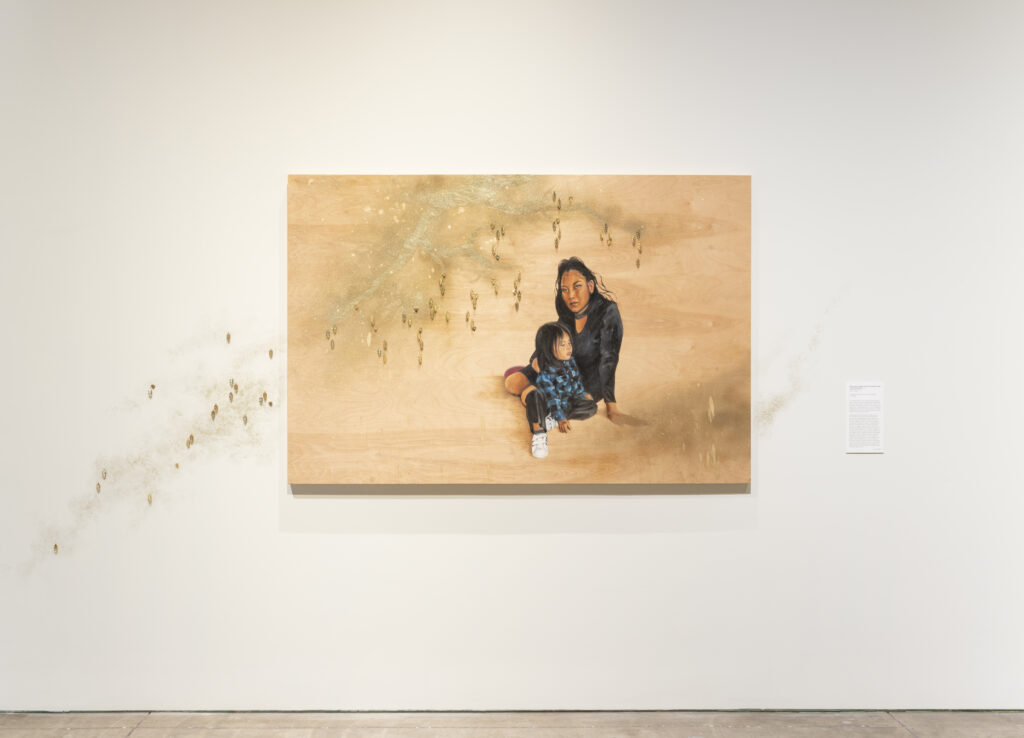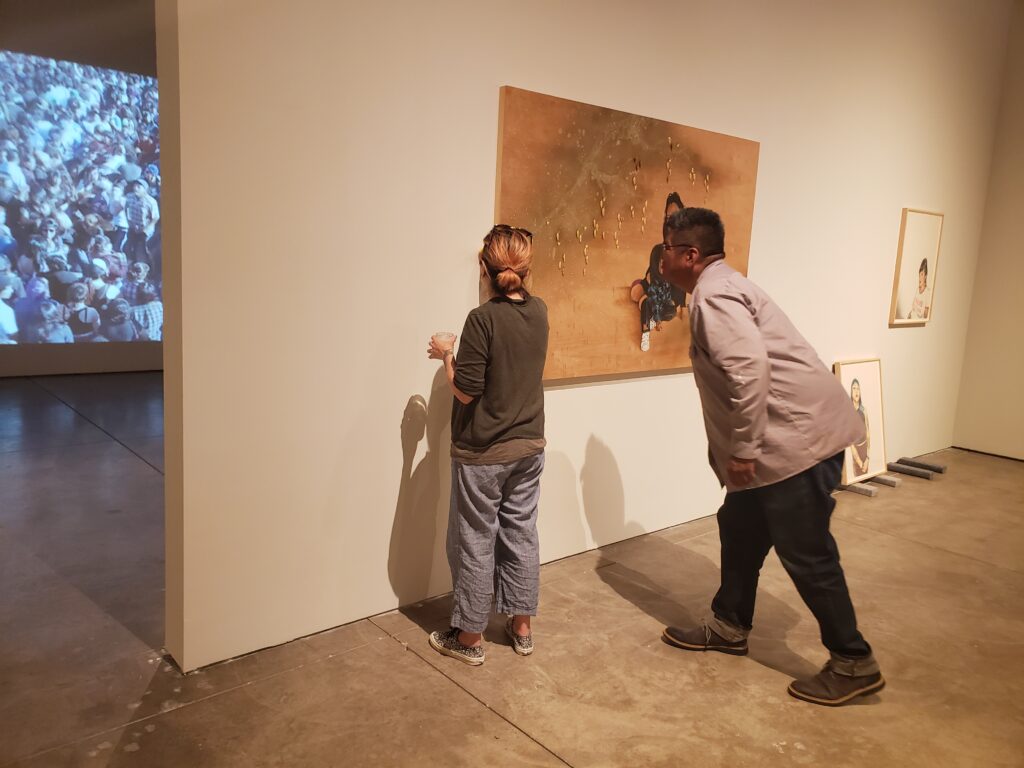On February 15, the Museum opened its first yearlong collection show Unapologetic: All Women, All Year, highlighting works by women-identifying artists to bring awareness to the systemic exclusion of these artists from museum collections, where women constitute an average of less than 15% of the artists in museum collections nationally. One month later, the Museum temporarily closed its doors due to the COVID-19 pandemic.
Due to the circumstances, this introspective and long look at the collection is now available online, which allows audiences to access visual and written material on the works in the exhibition. Included in the physical exhibition is a wall designated for rotating works—a place to share new acquisitions and exceptional artworks by women artists. We updated our online exhibition to include a virtual “rotation wall,” where we can share in-depth looks at artworks in our collection.

Shizu Saldamando
Through intimate and provocative paintings, drawings, and video, Shizu Saldamando presents a contemporary take on portraiture that explores and challenges the constructs of identity. She works from informal snapshots of friends and family, focusing on often-overlooked communities of color: punks, queers, activists, and artists. Challenging the traditional conventions of wealth and prestige in portraiture, Saldamando presents work that allows the underground crowd to see themselves reflected and affirmed in contemporary culture, while making them visible to new audiences.
From her own perspective and upbringing in a mixed culture family (her parents are Mexican American and Japanese American) Saldamando is particularly sensitive to the power dynamics that can come from an artist-subject relationship. By working with only people she knows, Saldamando refuses any notions of subjugation, and instead elevates her acquaintances into prominent positions. Simultaneously, she is highlighting important members of what the late queer theorist José Esteban Muñoz called a brown commons—a potentially radical space inhabited by both working-class Latinx queer immigrants and queer-of-color punks and artists.[1]
During summer 2019, Saldamando made a special portrait titled Grace and Ira, Golden Hour At and Despite Steele Indian School Park for her exhibition southwestNET: Shizu Saldamando at SMoCA. Saldamando met Grace and Ira through her friend and artist Douglas Miles (who is Grace’s father, Ira’s grandfather), and, on a sunny day in winter, they met up at Steele Indian School Park in Phoenix to photograph the mother and son for their portrait. During their visit, Grace shared the tragic history about Phoenix’s Indian School that separated Native American children from their families on the reservation as a way to assimilate them into white culture at a young age. This weighed heavy on the artist as she photographed the young Native American mother with her son in a place that once sought to separate them.
In the painted portrait, a dusting of gold shimmer and leaves hover above their heads and flows from the wood panel on to the adjacent wall. The artist often excludes the background as a way to focus in on the people, but in this double portrait Saldamando uses the gold cloud to suggest the tree that protected them from the desert sun—and possibly an abstract representation of past indigenous mothers and their children.
Alongside the painting is this statement by Grace Miles about Indigenous motherhood:
“For whatever reason, I felt no feelings about finishing school. I did, then I didn’t. I already forgot about all the crying and guilt I endured while in school. I forgot about the racism and classism. I forgot the time that my car broke down. I forgot getting up at 4:00 a.m. and getting dressed so we could catch the bus at 5:00 a.m. I forgot dropping him off on the bus and catching another one to get to school on time every day.
I understand that I started school to make money for my family and me, and I know that they are all proud of me. Throughout this journey, I had a lot of thoughts about what indigenous motherhood is and how many different pictures are painted of indigenous motherhood. Carrying your baby in a cradle board on your back is beautiful but so is carrying your baby in your arms, bundled up every morning on the way to the city bus. Indigenous motherhood isn’t only women and their child in regalia in the mountains. Indigenous motherhood is any of us native mothers hustling in the city, going to school, doing what have to while dealing with racism, trauma, capitalism, violence, depression, and hatred. It is the mothers on the rez, teaching children how to survive while we’re trying to learn that lesson ourselves. Motherhood to me is holding you up when you want to crumble under it all. It is being in love with every inch of the brown skin on my body that walks with me to bus stops and grocery stores and libraries here in this city. Holding Ira is enough to keep me going. Thank you, Ira.”

Read more about Shizu Saldamando in this L.A. Times article that discusses the artist’s connection to the Latinx and punk communities in Los Angeles, Phoenix, Houston, and San Francisco, as well as how her Mexican Japanese family’s complex history in the United States has informed her work.
During these uncertain times, SMoCA has invited artists and staff to utilize our blog Inspire as an outlet to make meaningful connections by sharing personal reflections and insight into their practice.
Take a moment to read other entries from our Museum Musings series.
Unapologetic: All Women, All Year is organized by the Scottsdale Museum of Contemporary Art. Curated by Lauren R. O’Connell, assistant curator, with Keshia Turley, curatorial assistant. The exhibition is part of Feminist Art Coalition (FAC), a national platform for art projects informed by feminisms. For more information, visit feministartcoalition.org.
[1] As quoted by Raquel Guitérrez, Memories of the Skin: Shizu Saldamando’s Portraits, Los Angeles Review of Books.
Back to Inspire home.
CONNECTIONS: Spark | Amplify | Immerse


